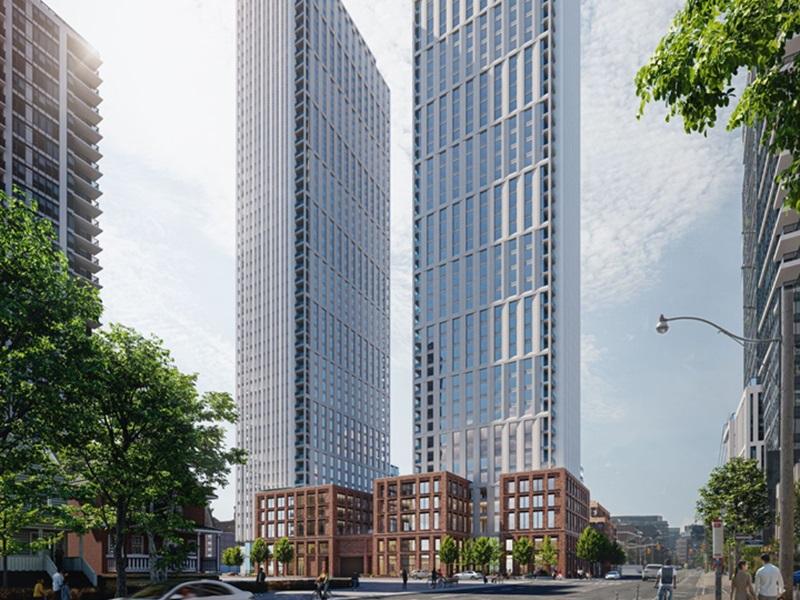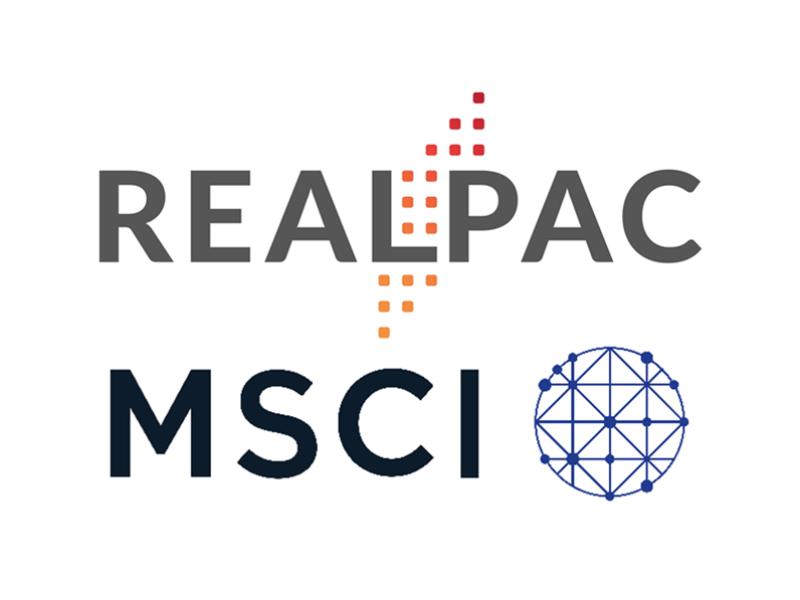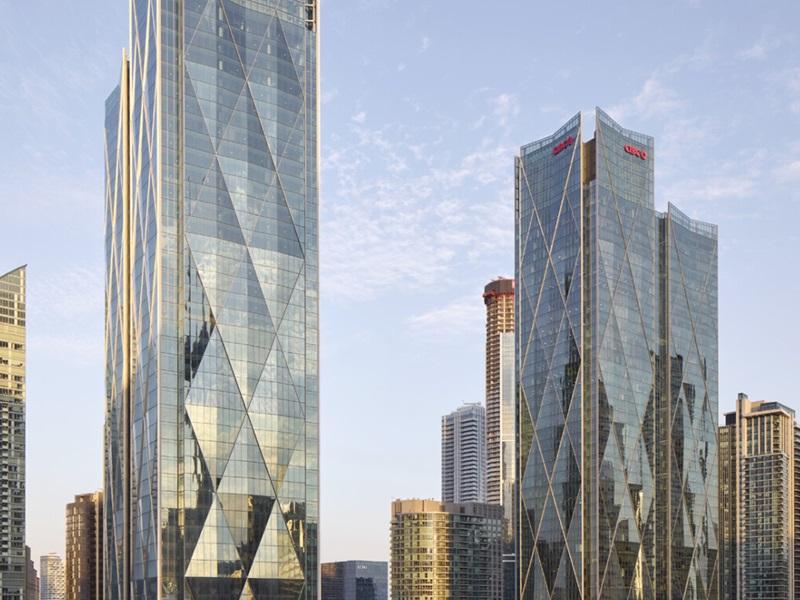
Skyline Industrial REIT acquired this 325,777-square-foot, state-of-the-art facility at 151 Reverchon Ave. in the Montreal suburb of Pointe-Claire as part of a development partnership with developer RoseFellow. (Courtesy Skyline Industrial REIT)
Despite an unprecedented amount of ongoing industrial facility development, continued strong demand has kept vacancy rates across Canada below two per cent.
A session at Sept. 8’s RealREIT conference at the Metro Toronto Convention Centre, moderated by RBC Capital Markets Real Estate Group managing director David Tweedie, featured four executives discussing how recent events have impacted the asset class and their expectations for the future.
Tweedie opened the session with a presentation outlining the state of the market.
“From a fundamentals perspective, we’re sitting at record national-low availability, double-digit rental rate growth continues in most major markets and (there are) record tenant absorption levels,” Tweedie said. “But on the headwind side, we’re facing moderating GDP, elevated inflation, the potential risk of recession in 2023 and continuing rising interest rates.”
Canadian industrial market snapshot
Canada’s nine largest markets have an industrial availability rate of 1.6 per cent, which is down 70 basis points year-over-year and some markets have an availability rate of below one per cent.
Asking rents in the second quarter were 34 per cent higher than a year earlier and have doubled over the past five years.
The price per square foot for industrial space has risen by more than 30 per cent.
There were 37 million square feet of new industrial space delivered in the past year, while there were 44 million square feet of net absorption. An additional 41.6 million square feet is under construction and due to be delivered this year and in 2023 — and about 60 per cent of it is already leased.
There will be about 14 million square feet of industrial space delivered in the Greater Toronto Area (GTA) this year, but the vacancy rate will remain below one per cent.
There was also a record high in industrial transaction value last year and, while there’s been a slowdown in Q3 this year, it’s expected the 2022 total will be close to that of 2021.
Investors and lenders like industrial sector
National Bank Financial director of real estate equity research Matt Kornack, who covers the multiresidential and industrial asset classes, said investors are looking at industrial as the asset class with the most growth and smallest capital expenditures.
However, Kornack said investors are also looking at returns on a one-year basis even though real estate is a long-term business. That has hurt many REITs and caused them to trade at a discount to net asset value.
Kornack expects more targeted lending, with lenders gravitating toward industrial because of its strong fundamentals.
He noted Canada has lagged the U.S. in industrial rent growth trajectory, but he’s bullish about rents continuing to increase and capital continuing to flow into the asset class.
In light of rent growth, Kornack said tenants will need to come up with ways to use their space more efficiently.
Skyline Industrial REIT
Guelph-based and privately held Skyline Industrial REIT owns 57 properties totalling 8.75 million square feet in 33 communities in five provinces valued at $1.25 billion.
Skyline Industrial REIT was previously focused on smaller properties in secondary markets, but moved midway through last year to sell virtually all of its small-bay industrial properties.
It has sold about $450 million worth and is redeploying the capital into newer properties, including a recently announced 16-building, two-million-square-foot, $309.25-million portfolio in Calgary and Edmonton.
Skyline Industrial REIT president Mike Bonneveld said there are just two vacancies in his entire portfolio and the REIT has offers on both.
Bonneveld noted tenants have become more educated and aware of rising rents. Some of the sticker shock has evaporated when they’re faced with doubled or tripled rents upon renewal and there’s nowhere else to go due to a supply shortage.
Skyline Industrial REIT is partnering with other developers, including on a 20-acre parcel of land in Halifax that marks its first foray into the Maritimes, as well as a deal with Montreal-based Rosefellow.
That second partnership includes a 325,777-square-foot, state-of-the-art facility at 151 Reverchon Ave. in the Montreal suburb of Pointe-Claire.
“We’ve just, as of last week, closed on our second fund with them,” Bonneveld said of Rosefellow. “We’ve got about 11 projects underway, with the majority in the GMA (Greater Montreal Area), that will deliver about three million square feet by the time we’re done.”
Some of Skyline Industrial REIT’s developments have been completely pre-leased before construction has started and tenants are committing to buildings that won’t be ready until Q3 or Q4 2023.
“The reason we’re in development is to get the pipeline of assets,” said Bonneveld. “We’re not doing it to build and flip. We’re in it to get very good product in the core markets we want to be in.”
One area of concern is getting product out of industrial properties, as more truck drivers and trucking facilities are needed.
Bonneveld said Skyline Industrial REIT bought a trucking facility as a land development play a year-and-a-half ago and saw its rents triple and its value significantly increase, so it no longer plans to redevelop the site.
PROREIT
Industrial space comprises about 80 per cent of Montreal-based PROREIT’s (PRV-UN-T) gross leasable area.
It owns about seven million square feet across Canada valued at approximately $1 billion. Its stock price is trading at about 28 per cent below net asset value, according to Mark O’Brien, PROREIT’s senior vice-president of leasing, operations and sustainability.
PROREIT was very active on the industrial acquisition front late in 2021.
It created a joint venture with Crestpoint Real Estate Investments Ltd. involving $455 million of mainly industrial properties, including a $228-million portfolio in Halifax’s Burnside Industrial Park, in June.
PROREIT and Crestpoint jointly own a portfolio of 42 properties, 41 in Halifax and one in Moncton, N.B., comprising nearly 3.1 million square feet of gross leasable area. O’Brien said they’ve taken rents from $8 to $12 and potentially $16 in Halifax.
O’Brien said there’s been no slowdown in leasing in any of the markets PROREIT is in and leasing spreads have been accelerating.
While PROREIT is looking at development opportunities as they come along, O’Brien said it’s primarily focused on earning good yields from stabilized assets in secondary markets as development yields compress.
Dream Industrial REIT
Dream Industrial REIT (DIR-UN-T) has about $6.5 billion in assets under management in Canada, Europe and the U.S. It has about three million square feet of space in its development pipeline.
Chief operating officer Alexander Sannikov said Dream Industrial’s priority is to grow the portfolio across geographies and it’s increasingly focused on speculative development. It prefers mid-sized projects over mega-projects.
Dream Industrial continues to sign lease deals in Canada and demand remains high. The REIT is pursuing acquisitions and is interested in strategic joint ventures.
Demand is also strong in Europe, where Dream Industrial signed two large-lease deals in the traditionally very slow month of August. It also had five tenants competing for an industrial development in Germany.
Sannikov said the European industrial market is dominated by merchant developers, whereas there are more build-to-hold developers in Canada.
He thinks returns are currently strongest in development and Dream Industrial can receive significant yield premiums.











